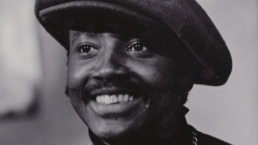These life stories may contain descriptions of childhood trauma and abuse, as well as images, voices and names of people now deceased. If you need help, you can find contact details for some relevant support services on our support page.
African American soul singer, Donny Hathaway (1945-1979), grew up in kinship care.
Donny Hathaway was born in Chicago to Drusella Huntley and Hosea Brown, a traumatised returned serviceman. His parents separated when he was three years old. Donny’s mother was unable to support him on her own, so she sent him to live with his grandmother, Martha Crumwell, in the Carr Square, St Louis, Missouri housing project.
“…it seems young Donny survived his broken home upbringing intact – as he’d later hint in ‘Put Your Hand in the Hand'” (Crazy Horse).
Martha Crumwell was a prominent member of Trinity Baptist Church and a “respected gospel singer and guitarist in her own right” who encouraged her grandson to sing.
At the age of four, Donny began playing piano and touring the local gospel circuit “dressed in a white sailor suit and playing a small ukulele” (Lordi). According to his sister, Jacqueline Bethany, “The other musicians in the church would stand around him and watch his hands, because the boy could play” (Gavin).
Donny began attending St Louis’ Vashon High School at the age of fourteen. In recognition of his prodigious musical talent, he was able to begin taking music theory classes at Washington University as a high school student.
Donny won a scholarship to Howard University, where he met his future wife, Eulaulah Vann, a fellow music major. Donny became a campus sensation singing with the Alpha Phi Alpha fraternity and a jazz trio.
Donny dropped out of university in his third year to pursue a professional music career in Chicago. He worked for Curtis Mayfield’s Curtom label as a producer and arranger for artists including Willie Nelson, Jerry Butler, and Aretha Franklin.
Donny released his first single, “The Ghetto, Pt. 1” after signing with Atlantic Records in 1969. His first chart hits were with Roberta Flack, including ‘You’ve Got a Friend’, ‘You’ve Lost That Lovin’ Feelin,’ and ‘Where Is the Love.’ By the age of twenty-eight, Donny had recorded five albums and won a Grammy.
Then, at the height of his music career, Donny began exhibiting erratic behaviour. He was diagnosed with paranoid schizophrenia, and hospitalised in both Chicago and New York. For the next five years, Donny did not record any music. According to his wife, Eulaulah, “something was not right.”
She called her husband’s management office and was told they had also noticed disturbing behavior, such as his randomly screaming at secretaries. “Well, when were you going to tell me?” she asked dryly (Edwards).
Finally, in 1978, Donny once again partnered with Roberta Flack on ‘The Closer I Get to You,’ which reached number two on the pop charts. In 1979, the pair began working on another album together in New York. However, it was never completed after Donny was found sobbing on the bathroom floor and afraid that someone had tried to kill him.
That night, Donny fell to his death from the fifteenth floor of the Essex Hotel in Manhattan. The coroner ruled his death as a suicide. He was only thirty-three years old and had two young daughters.
One of Donny’s daughters, Lalah Hathaway, became a successful singer who won a Grammy Award for her cover of his 1972 single, ‘Little Ghetto Boy,’ in 2016. In 2018, she opened the summer season of the Lincoln Center’s Out of Doors series by performing an entire concert of her father’s music.
Donny Hathaway received a Grammy Lifetime Achievement Award posthumously in 2019. He is remembered as:
“… part of the foundation of American soul music. His songs have influenced performers from R&B singer Alicia Keys to rapper Common to singer-guitarist George Benson” (Keyes).
References:
Cheers, Michael. (1979). “The mysterious death of Donny Hathaway”. Ebony, 34, 60-65.
Crazy Horse, Kandia. (1999). Donny Hathaway: a soul man who departed too soon. Reprinted in The Guardian, 9 January 2014. https://www.theguardian.com/culture/2014/jan/08/donny-hathaway-rocks-backpages
Edwards, Gavin. “Donny Hathaway’s Daughter Lalah Is Finally Ready to Honor Him in Concert.” The New York Times, 22 July 2019. https://www.nytimes.com/2019/07/22/arts/music/donny-hathaway-lalah-hathaway.html
Keys, Allison. “Donny Hathaway: Neglected Heart Of Soul.” NPR Morning Edition, 21 June 2010. https://www.npr.org/2010/06/21/127935255/donny-hathaway-neglected-heart-of-soul
Lordi, Emily J. (2016). Donny Hathaway Live. Bloomsbury Academic.
Image available here.
